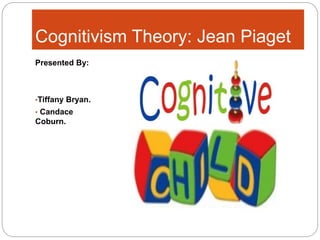
Cognitivism Theory//Jean Piaget
- 1. Cognitivism Theory: Jean Piaget Presented By: •Tiffany Bryan. • Candace Coburn.
- 2. What is Cognitivism????? • Cognitivism can be defined as the study in psychology that focuses on mental processes, including how people think perceive and learn, to solve problems and direct their attention to one stimulus rather than another. • The Cognitive Learning Theory explains why the brain is the most incredible network of information processing and interpretation in the body as we learn things. This theory can be divided into two specific theories: the Social Cognitive Theory (SCT), and the Cognitive Behavioral Theory (CBT).
- 3. Overview of the Theory!!! Jean Piaget theory of cognitive development originated firstly through his interested in animals, and how they were equipped to cope with their environment and have the ability to survive. Piaget became intrigued with the reasons children gave for their wrong answers on the questions that required logical thinking. He believed that these incorrect answers revealed important differences between the thinking of adults and children. Piaget believed that all the stages of development were the same for each child and that each one has to be passed in sequence.
- 4. What other theorist say about the Cognitivism? According to Vygotsky (1978), much important learning by the child occurs through social interaction with a skillful tutor. Vygotsky believes that young children are curious and actively involved in their own learning and the discovery and development of new understandings. However, Vygotsky placed more emphasis on social contributions to the process of development, whereas Piaget emphasized self-initiated discovery.
- 5. What other theorist say about Cognitivism? According to Vygotsky (1978), much important learning by the child occurs through social interaction with a skillful tutor. Vygotsky believes that young children are curious and actively involved in their own learning and the discovery and development of new understandings. However, Vygotsky placed more emphasis on social contributions to the process of development, whereas Piaget emphasized self-initiated discovery.
- 6. Four Developmental Stages are described as: The Sensorimotor Stage: from birth to age two. The Preoperational Stage : from age two to age seven. The Concrete Operational Stage: from age seven to eleven. The Formal Operational Stage: from age eleven to sixteen.
- 7. Sensori-motor Stage From birth to age two . The infant constructs an understanding of the world by coordinating sensory experiences with physical actions. An infant progresses from reflexive instinctual action at birth o the beginning of symbolic thought to the end of the stage.
- 8. Preoperational Stage From ages two –seven. The child begins to represent the world with words and images. Their thinking ability increases where as they are able to make logical responses with gestures. At this stage the child play is categorized as symbolic play and manipulating symbols.
- 9. Concrete Operational From ages seven-eleven At this stage a child starts to attach concepts to concrete situations. At this stage the child learns rules such as conservation. At this stage the child can also think logically about objects and events.
- 10. Formal Operational Stage From eleven to sixteen. At this stage the adolescent can transcend the concrete situation and think about the future. Think abstractly, reason theoretically. Not all people reach this stage
- 11. Examples of Cognitivism in the Classroom by the Teacher Teach students using representative pictures to accommodate their level of learning. Power points and movies can be shown relating to the subject matter. Teach students all types of learning, going outside to do activities. Show how to do activities and have students follow.
- 12. References Overview on jean piagets theory of cognitive development. (n.d.). Retrieved February 10, 2015, from http://www.ukessays.com/essays/psychology/overview-on-jean-piagets- theory-of-cognitive-development-psychology • Piaget's theory - Google Search. (n.d.). Retrieved February 10, 2015, from https://www.google.com.jm • “Cognitivism.” Cognitivism (2008) (n.d) Retrieved February 13, 2014 <http://www.learningtheories.com/cognitivism Berk, Laura E. (2009). Child Development. 8th ed. United States of America: Pearson Education, Inc. Erikson E (1968), Identity, Youth, and Crisis, New York: Norton Lawrence A. Tomei (2005) Taxanomy for the technology domain, pg 109.
Editor's Notes
- In cognitive theory knowledge is used as a symbolic mental construct in the learner’s mind, ,learning is the means by which these symbolic representations are committed to memory (Taxanomy for the technology domain, Lawrence A. Tomei 2005)
- Working under Dr T. Simon, who was one of the first inventers of the intelligence test, and analyzing the results of tests carried out on children, gave Piaget the motivation on finding out what views of the world and how their thinking changed as they got older.
- During the sensorimotor stage infants use reflexes, such as sucking thumbs. Children cannot perceive the world through movement and their five senses.
- Such play as pieces of paper being plates and a box being a table, checkers being snacks.